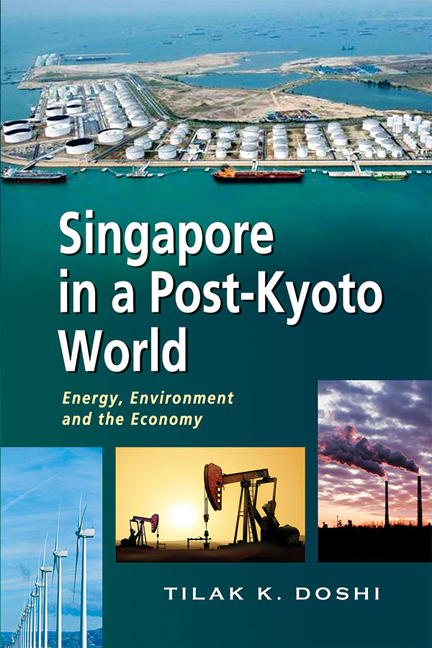Book contents
- Frontmatter
- Dedication
- Contents
- List of Tables and Figures
- Preface
- Acknowledgements
- List of Abbreviations
- Introduction
- 1 Economy, Energy, and Emissions
- 2 Climate Change Negotiations: From Copenhagen to Durban via Cancun
- 3 Climate Change Finance: Who Pays and Who Receives?
- 4 Singapore's External Sector: Impacts of Emission Mitigation Policies
- 5 Energy and Emissions: The Five Strategies
- 6 Concluding Remarks: “The Three E's”
- Index
- About the Author
- Frontmatter
- Dedication
- Contents
- List of Tables and Figures
- Preface
- Acknowledgements
- List of Abbreviations
- Introduction
- 1 Economy, Energy, and Emissions
- 2 Climate Change Negotiations: From Copenhagen to Durban via Cancun
- 3 Climate Change Finance: Who Pays and Who Receives?
- 4 Singapore's External Sector: Impacts of Emission Mitigation Policies
- 5 Energy and Emissions: The Five Strategies
- 6 Concluding Remarks: “The Three E's”
- Index
- About the Author
Summary
Twenty-five years ago, the publicly accessible literature of what can be broadly termed the “energy economics” of Singapore was practically nonexistent. Outside of specialized trade publications, proprietary consultant reports and periodic assessments by government agencies often for an internal civil service and ministerial audience, there was little by way of information about how energy issues, at global, regional and domestic levels, were affecting Singaporeans. To be sure, it is also true that the demand for such information primarily emanated from those relative few who “did” energy, that is, those who were in the energy industry as businessmen, academics, or civil servants responsible for some area of activity in the industry.
Energy issues occupied policymakers whose bailiwick include aspects of the energy sector, ranging from managing state-owned power utilities and attracting foreign direct investments in the export-oriented oil refining and petrochemical industry to setting up competitive domestic markets for petrol and diesel. But outside of these government responsibilities, the energy scene in the first decades of independence was primarily a private sector one, revolving around oil. Coal, natural gas, and other primary fuels had little or no role to play in the early years of the city-state. Post-independence government policy with respect to energy sector issues, wrought in an environment which saw the loss of its Malayan hinterland in the Malaysian Federation in 1965, was essentially one of properly managing public utilities, providing a hospitable investment climate for large investments in an export-oriented downstream oil sector, and ensuring a competitive domestic retail market for transport fuels.
Singapore had, by the 1980s, emerged as one of the world's great oil refining and trading centres, with the “East of Suez” region within its sphere of influence. Yet, little systematic work was done on the country's role in energy affairs, unique among its developing country counterparts in Asia, Africa, and elsewhere. The city-state's policymaking went against the grain in much of its practice of economic development. It ensured that energy products were bought and sold in the domestic market at essentially global prices (adjusted for indirect taxes), in contrast to the common practice in developing countries of subsidizing energy fuels for social equity.
- Type
- Chapter
- Information
- Singapore in a Post-Kyoto WorldEnergy, Environment and the Economy, pp. xi - xivPublisher: ISEAS–Yusof Ishak InstitutePrint publication year: 2015



